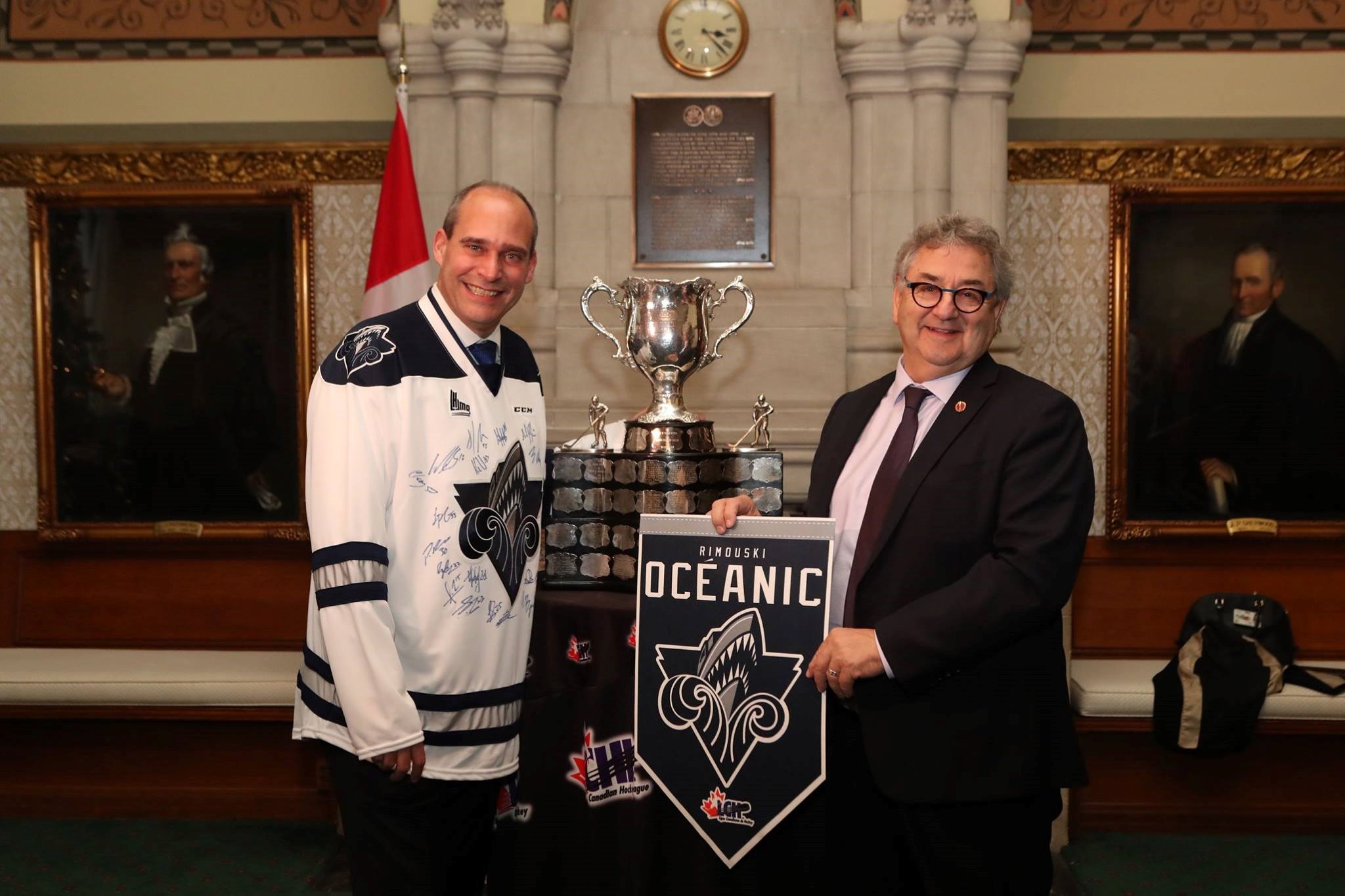Meet Senator Éric Forest

Éric Forest was appointed to the Senate of Canada in November 2016. Senator Forest has worked for the development of Eastern Quebec for over 40 years. As the Mayor of Rimouski from 2005 to 2016, he engaged the Rimouski community through a strategic plan that guides the development of a respectful, united community.

Who inspired you to get involved in public life?
From a very young age, my family sparked in me a desire to get involved in the community. Some of my uncles from the Arsenault family and my godfather, Gildas Forest, were examples and mentors for me.
But it was my parents who instilled in me the values that have guided me all my life—respect, hard work, justice and solidarity.
As for participating in public life, I have wanted to get involved since my teenage years. But it was my neighbours who started it all by encouraging me to become a city councillor in Pointe-au-Père in 1979. That was the beginning of a marvelous 26-year adventure, devoting my time to improving the daily lives of my fellow citizens.
What do you think are the biggest public policy issues facing Canada today?
The world is changing quickly, and we face huge challenges. I think we have to deal with three key issues.
First, at the individual level, we have to create an environment that encourages young men and women to get into politics. I’m deeply convinced that they have a lot to offer — new ways of seeing and doing things that could greatly benefit our society. Our institutions have to make decisions in the interest of the majority and based on the values of respect and solidarity. To do so, our institutions absolutely must consist of individuals who reflect society as it is today.
This diversity will be the source of solutions tailored to the realities of the 21st century. Given the current make-up of these decision-making bodies, we need to make every effort to increase the involvement of young men and especially young women.
Second, with regard to governance, we have to review the areas of jurisdiction for the various levels of government, from the federal to the provincial to the municipal. The way our system is organized dates back in part to the 19th century and is, quite frankly, no longer suited to the realities of the 21st century and its major issues, such as globalization and the fight against climate change. The European Union was built over the past few decades on the principle of subsidiarity — that is, giving responsibility for an issue to the government that will deal with it best. I’m convinced that Canada would do well to adopt this approach. The three levels of government (federal, provincial and municipal) would have to make these changes in a responsible way and in the public interest. There are three levels of government, but all the work is for the same citizens.
Third, our society as a whole needs to learn how to live together better, with all the challenges that brings. We live in a rapidly changing world. Think about immigration, for example. One of our society’s great challenges is ensuring we have enough skilled workers to keep our institutions and businesses functioning.
Immigration is part of the solution to this labour force problem. However, taking in and integrating newcomers in a harmonious way is a challenge, and we have to create the conditions to help us all live together in harmony.

Why should more Canadians care about what happens in the Senate?
It’s quite simple. Without the need to toe the party line or fight an election every four years, senators can make decisions based on their principles and values, not on their re-election prospects. In this way, we provide an important and complementary perspective to the work of the House of Commons. I think this distance from partisan and electoral considerations is what creates true independence.
This non-partisan, sober second thought provides added value to the analysis of bills and public policy issues. More specifically, I believe the quality of work done by Senate committees deserves more attention from Canadians. Our rigorous studies and analyses delve deeply into the often sensitive yet vital issues facing Canadian society.
I have been a Senator since November 23, 2016. I can tell you that, when I look at my colleagues who have been here for 5, 10 or even 20 years, I feel very fortunate to sit alongside individuals with so much experience and skill. The level of expertise of the members of the upper house is another reason Canadians should take an interest in its work.
What legislative or committee work are you most proud of participating in to date?
Since arriving at the Senate, I have sat on the Senate Committee on National Finance, and I find its work particularly exciting. I’m pleased to have taken part in the lengthy study on Canada’s infrastructure funding. The scale of public investment is upwards of $100 billion over 10 years, so we have a major interest in ensuring the program meets its objectives, for the benefit of all Canadians. I’m especially proud of having been the voice of cities and of having shared proposals with my colleagues that I hope will help these public funds be used more efficiently.

What is a hidden gem in your region that more Canadians need to know about?
To be honest, I would have a lot of trouble naming just one hidden gem in my region. The Lower St. Lawrence and the Gaspé Peninsula are full of magnificent places, but above all, they’re home to generous and creative people who offer unparalleled hospitality. Here are some can’t-miss stops if you’re passing through:
- The Pointe-au-Père Lighthouse National Historic Site, where you can learn more about the worst maritime disaster in Canadian history (the sinking of the Empress of Ireland in 1914) and visit the submarine Onondaga
- The Reford Gardens National Historic Site, where you can admire over 3,000 species and varieties of plants
- The Festival en chanson de Petite-Vallée, where the next generation of Quebec musicians takes centre stage
- The Bonaventure River, one of the clearest rivers in North America
- And obviously the Magdalen Islands — spectacular!
Can you name a guilty pleasure song or album that always makes you smile and why?
The song “Le début d’un temps nouveau” by Stéphane Venne (music and lyrics).
The song motivates me when I’m taking on a new professional or personal challenge. I never want to accept a situation as it is presented to me. I try to see whether the existing rules can be changed in order to make things more effective or more in sync with the realities of the time.
What was the last book you read or movie you saw that you recommended to someone else and why?
A book that affected me deeply is Touch the Earth: A Self-Portrait of Indian Existence, compiled by Teresa Carolyn McLuhan. This book is a collection of writings by important Aboriginal leaders. It’s very inspiring, and it taught me a lot about Aboriginal culture.

What sports team (professional or amateur) do you support?
I’m sure you understand when I say that it’s obviously the Rimouski Océanic, the home team for an entire region! As the CEO of the team for its first 10 years (1995−2005), I experienced incredible moments with amazing people like Maurice Tanguay, Vincent Lecavalier, Brad Richards, Sidney Crosby and many more.
Why are you proud to be Canadian?
I’m very proud to be Canadian because we live in a responsible country, where everyone shares the values of respect and solidarity. We also enjoy a great deal of freedom.
Canada is a rich country made up of dynamic and diverse citizens. We also have an amazing natural heritage.


Banner photo: Senator Forest is a firm believer in the benefits of arts and culture for communities. During his time as mayor, the senator had a public piano installed in downtown Rimouski.
Related articles
Tags
Committee news
Meet Senator Éric Forest

Éric Forest was appointed to the Senate of Canada in November 2016. Senator Forest has worked for the development of Eastern Quebec for over 40 years. As the Mayor of Rimouski from 2005 to 2016, he engaged the Rimouski community through a strategic plan that guides the development of a respectful, united community.

Who inspired you to get involved in public life?
From a very young age, my family sparked in me a desire to get involved in the community. Some of my uncles from the Arsenault family and my godfather, Gildas Forest, were examples and mentors for me.
But it was my parents who instilled in me the values that have guided me all my life—respect, hard work, justice and solidarity.
As for participating in public life, I have wanted to get involved since my teenage years. But it was my neighbours who started it all by encouraging me to become a city councillor in Pointe-au-Père in 1979. That was the beginning of a marvelous 26-year adventure, devoting my time to improving the daily lives of my fellow citizens.
What do you think are the biggest public policy issues facing Canada today?
The world is changing quickly, and we face huge challenges. I think we have to deal with three key issues.
First, at the individual level, we have to create an environment that encourages young men and women to get into politics. I’m deeply convinced that they have a lot to offer — new ways of seeing and doing things that could greatly benefit our society. Our institutions have to make decisions in the interest of the majority and based on the values of respect and solidarity. To do so, our institutions absolutely must consist of individuals who reflect society as it is today.
This diversity will be the source of solutions tailored to the realities of the 21st century. Given the current make-up of these decision-making bodies, we need to make every effort to increase the involvement of young men and especially young women.
Second, with regard to governance, we have to review the areas of jurisdiction for the various levels of government, from the federal to the provincial to the municipal. The way our system is organized dates back in part to the 19th century and is, quite frankly, no longer suited to the realities of the 21st century and its major issues, such as globalization and the fight against climate change. The European Union was built over the past few decades on the principle of subsidiarity — that is, giving responsibility for an issue to the government that will deal with it best. I’m convinced that Canada would do well to adopt this approach. The three levels of government (federal, provincial and municipal) would have to make these changes in a responsible way and in the public interest. There are three levels of government, but all the work is for the same citizens.
Third, our society as a whole needs to learn how to live together better, with all the challenges that brings. We live in a rapidly changing world. Think about immigration, for example. One of our society’s great challenges is ensuring we have enough skilled workers to keep our institutions and businesses functioning.
Immigration is part of the solution to this labour force problem. However, taking in and integrating newcomers in a harmonious way is a challenge, and we have to create the conditions to help us all live together in harmony.

Why should more Canadians care about what happens in the Senate?
It’s quite simple. Without the need to toe the party line or fight an election every four years, senators can make decisions based on their principles and values, not on their re-election prospects. In this way, we provide an important and complementary perspective to the work of the House of Commons. I think this distance from partisan and electoral considerations is what creates true independence.
This non-partisan, sober second thought provides added value to the analysis of bills and public policy issues. More specifically, I believe the quality of work done by Senate committees deserves more attention from Canadians. Our rigorous studies and analyses delve deeply into the often sensitive yet vital issues facing Canadian society.
I have been a Senator since November 23, 2016. I can tell you that, when I look at my colleagues who have been here for 5, 10 or even 20 years, I feel very fortunate to sit alongside individuals with so much experience and skill. The level of expertise of the members of the upper house is another reason Canadians should take an interest in its work.
What legislative or committee work are you most proud of participating in to date?
Since arriving at the Senate, I have sat on the Senate Committee on National Finance, and I find its work particularly exciting. I’m pleased to have taken part in the lengthy study on Canada’s infrastructure funding. The scale of public investment is upwards of $100 billion over 10 years, so we have a major interest in ensuring the program meets its objectives, for the benefit of all Canadians. I’m especially proud of having been the voice of cities and of having shared proposals with my colleagues that I hope will help these public funds be used more efficiently.

What is a hidden gem in your region that more Canadians need to know about?
To be honest, I would have a lot of trouble naming just one hidden gem in my region. The Lower St. Lawrence and the Gaspé Peninsula are full of magnificent places, but above all, they’re home to generous and creative people who offer unparalleled hospitality. Here are some can’t-miss stops if you’re passing through:
- The Pointe-au-Père Lighthouse National Historic Site, where you can learn more about the worst maritime disaster in Canadian history (the sinking of the Empress of Ireland in 1914) and visit the submarine Onondaga
- The Reford Gardens National Historic Site, where you can admire over 3,000 species and varieties of plants
- The Festival en chanson de Petite-Vallée, where the next generation of Quebec musicians takes centre stage
- The Bonaventure River, one of the clearest rivers in North America
- And obviously the Magdalen Islands — spectacular!
Can you name a guilty pleasure song or album that always makes you smile and why?
The song “Le début d’un temps nouveau” by Stéphane Venne (music and lyrics).
The song motivates me when I’m taking on a new professional or personal challenge. I never want to accept a situation as it is presented to me. I try to see whether the existing rules can be changed in order to make things more effective or more in sync with the realities of the time.
What was the last book you read or movie you saw that you recommended to someone else and why?
A book that affected me deeply is Touch the Earth: A Self-Portrait of Indian Existence, compiled by Teresa Carolyn McLuhan. This book is a collection of writings by important Aboriginal leaders. It’s very inspiring, and it taught me a lot about Aboriginal culture.

What sports team (professional or amateur) do you support?
I’m sure you understand when I say that it’s obviously the Rimouski Océanic, the home team for an entire region! As the CEO of the team for its first 10 years (1995−2005), I experienced incredible moments with amazing people like Maurice Tanguay, Vincent Lecavalier, Brad Richards, Sidney Crosby and many more.
Why are you proud to be Canadian?
I’m very proud to be Canadian because we live in a responsible country, where everyone shares the values of respect and solidarity. We also enjoy a great deal of freedom.
Canada is a rich country made up of dynamic and diverse citizens. We also have an amazing natural heritage.


Banner photo: Senator Forest is a firm believer in the benefits of arts and culture for communities. During his time as mayor, the senator had a public piano installed in downtown Rimouski.


